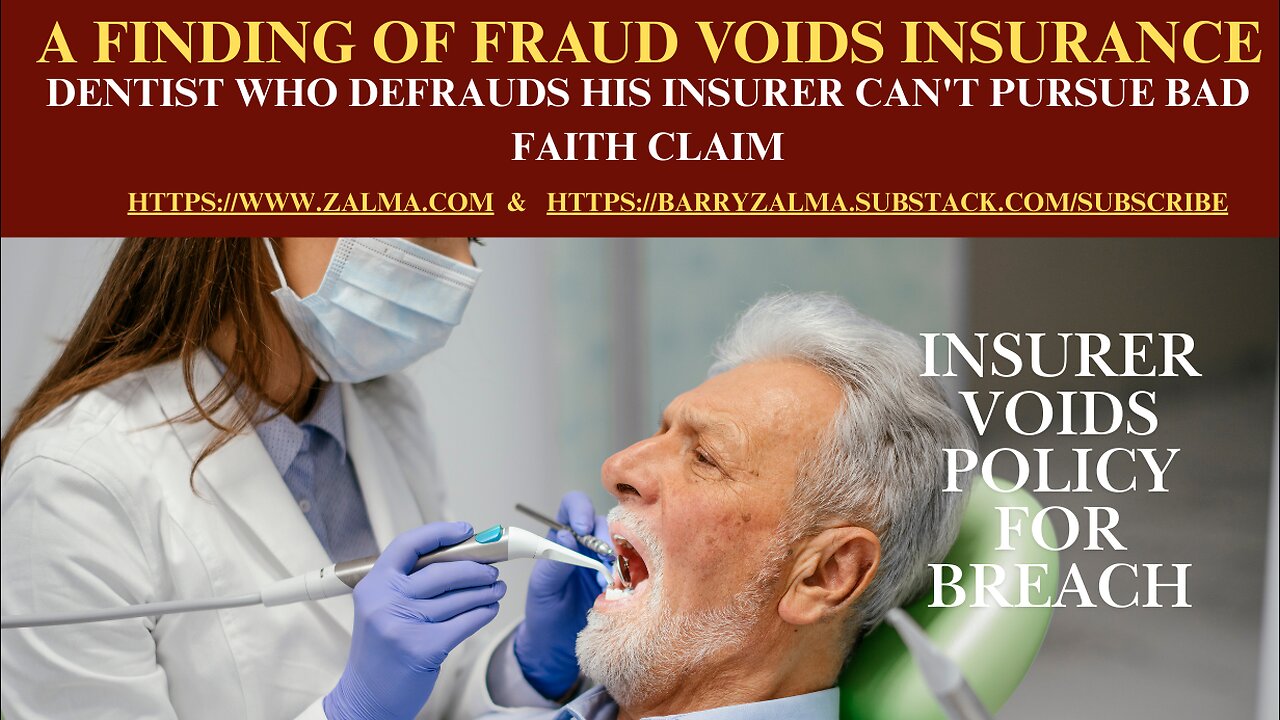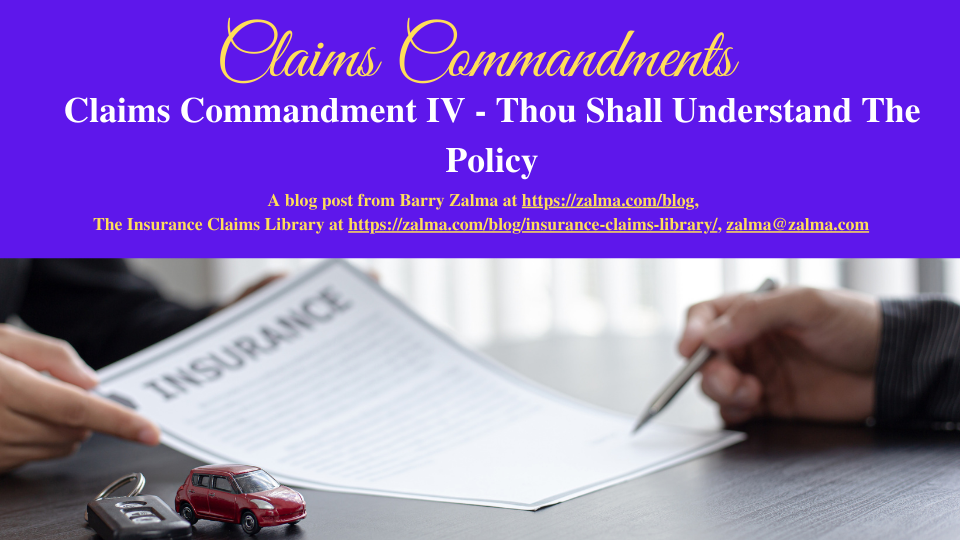
Claims Commandment Number IV Thou Shall Understand The Policy
Read the full article at https://lnkd.in/gGf5zzjp and see the full video at https://lnkd.in/gJXWW43V and at https://lnkd.in/gxE8peEG and at https://zalma.com/blog plus more than 4350 posts.
In this the fourth of Fifteen Claims Commandments we deal with the need for every insurance claims professional to read and understand the terms and conditions of the policy that made promises to an insured who is presenting a claim.
Insurance Policies are Contracts
Insurance policies are contracts. To understand insurance claims the adjuster must understand how all contracts, and specifically insurance contracts, are interpreted. Rules of contract interpretation have developed over the last 300 years and are applied by courts with the intent to fulfill the desires of all parties to the contract.
People and judges who are not conversant in insurance and the interpretation of insurance contracts believe that the insurance policy is difficult to read and understand. They are wrong. However, as one court said in Delancy v. Rockingham Farmers Mutual, 52 N.H. 581 (1873):
This [policy], if read by an ordinary man, would be an inexplicable riddle, a mere flood of darkness and confusion … should some extremely eccentric person attempt to examine the involved and intricate net in which he was to be entangled, he would find that it is printed in such small type and in lines so long and crowded as to make the perusal of the document physically difficult, painful and possibly injurious.
Since 1873 insurance policies are printed in large print and in language, by statute, that anyone with a fourth grade education can understand. Still, there seem to regularly be disputes taken to court about the meaning of terms, conditions and limitations of the policy of insurance.
The following rules govern the construction of contracts of insurance:
If the terms of a promise are in any respect ambiguous or uncertain, it must be interpreted in the sense in which the promisor believed at the time of making it, that the promisee understood it.
If a written contract is so worded that it can be given a definite or certain legal meaning, then it is not ambiguous. However, if the language of a policy or contract is subject to two or more reasonable interpretations, it is ambiguous.
When a policy is interpreted, the provisions of an endorsement control the interpretation over the body or declarations of a policy when the two are in conflict.
For example, if the language written to limit an insurer’s liability to the appraised value appears on the declarations page, while the valuation condition that provides for an actual cash value adjustment appears on a form endorsed to the contract, the endorsement’s language would control the interpretation of the contradictory language of the policy.
However, the fact that the two sentences could have been written more clearly, did not mean that they were ambiguous.
Reasonable Expectations
Consider the reasonable expectations of the insured but, when doing so, include the understanding that every insurer is presumed to be acquainted with the practice of the trade that the insurer insures.
More than 150 years ago the US Supreme Court in Hazard’s Administrator v. New England Marine Insurance Co., 33 U.S. 557 (1834) adopted the rule. The Supreme Court concluded that “no injustice is done if insurers are presumed to know their insureds’ industry because it is part of their ordinary business.”
In MacKinnon v. Truck Ins. Exch., 31 Cal.4th 635 (2003), the California Supreme Court first stated the primacy of the “reasonable expectations” test when interpreting insurance policies. It decided that the reasonable expectations of the insured required coverage to exist for an ordinary act of negligence even if it involved pollutants.
Where the language of the policy is clear, the language must be read accordingly, and where it is not, it must be read in the sense that satisfies the hypothetical insured’s objectively reasonable expectations.
If you find the term is clear and unambiguous there will be no need to apply the reasonable expectations test.
If you find any ambiguity, or determine the insured should be paid, the application of the reasonable expectations test will give a court the ability to construe the policy against the insurer and in favor of payment of the insured’s claim.
The Plain Meaning Test
Most states will apply the plain meaning test.
Long-established insurance law supports the conclusion that insurers are presumed to know and be bound by the meaning of the terms used and customs adopted in their insureds’ industries. Insurers, and insurance claims professionals, faced with a need to understand and apply the wording of a policy of insurance must now conduct their investigation to include:
a detailed investigation of the facts of the loss and policy acquisition;
a determination of the expectations of the insured and the insurer at the time the policy was acquired;
a determination of the purposes for which the policy was acquired; and
an examination of all communications between the insurer and the insured or their representatives.
To conclude a thorough investigation the insurer must at least conduct a detailed interview of the insured, the claimants, the brokers, and the underwriters. When there is a dispute over the meaning of common terms, the court will often find it necessary to inform upon the understanding of persons in the particular business insured so that the judge must consult the opinions of experts.
Expert testimony can be helpful in establishing that the insured’s or the insurer’s interpretation of the term at issue is different from that advanced by the other was reasonable. In California, this may be sufficient for a party to prevail because although insureds are treated differently so that even if the insurer’s interpretation is considered reasonable, it would still not prevail, for in order to do so it would have to establish that its interpretation is the only reasonable one.
An insurance claims professional can never make, or recommend, a decision with regard to an insurance claim until he or she has read the entire policy as it relates to a loss, interpret the policy wordings in accordance with the rules of interpretation stated above, conduct a complete and thorough investigation to determine the reasonable expectations of the insured, and if unable to decide to seek the advice of competent coverage counsel.
(c) 2022 Barry Zalma & ClaimSchool, Inc.
Barry Zalma, Esq., CFE, now limits his practice to service as an insurance consultant specializing in insurance coverage, insurance claims handling, insurance bad faith and insurance fraud almost equally for insurers and policyholders. He practiced law in California for more than 44 years as an insurance coverage and claims handling lawyer and more than 54 years in the insurance business. He is available at http://www.zalma.com and [email protected] and receive videos limited to subscribers of Excellence in Claims Handling at locals.com
https://zalmaoninsurance.locals.com/subscribe.Subscribe to Excellence in Claims Handling at https://barryzalma.substack.com/welcome.
Write to Mr. Zalma at [email protected]; http://www.zalma.com; http://zalma.com/blog; daily articles are published at https://zalma.substack.com. Go to the podcast Zalma On Insurance at https://anchor.fm/barry-zalma; Follow Mr. Zalma on Twitter at https://twitter.com/bzalma; Go to Barry Zalma videos at Rumble.com at https://rumble.com/c/c-262921; Go to Barry Zalma on YouTube- https://www.youtube.com/channel/UCysiZklEtxZsSF9DfC0Expg; Go to the Insurance Claims Library – https://zalma.com/blog/insurance-claims-library
Dentist Who Defrauds His Insurer Can’t Pursue Bad Faith Claim
Post number 5295
Read the full article at https://www.linkedin.com/pulse/finding-fraud-voids-insurance-barry-zalma-esq-cfe-yizic, see the video at and at and at https://zalma.com/blog plus more than 5250 posts.
In Andy Fletcher Montano v. The Dentists Insurance Company v. Dr. Sandy Fletcher Montano DDS, PLLC, Deer Park Dental, PLLC, No. 24-5202, United States Court of Appeals, Ninth Circuit (February 19, 2026) Sandy Fletcher Montano appealed pro se from the district court’s summary judgment in his diversity action against The Dentists Insurance Company (“TDIC”) alleging claims stemming from its denial of insurance coverage under a fraud clause in Montano’s policy.
ANALYSIS & DECISION
The Ninth Circuit concluded that the district court properly granted summary judgment on Montano’s claim for breach of contract because Montano ...

Declaratory Relief Granted to Insurer
Post number 5294
Suit for Defective Windows Excluded from Insurance
See the video at and at and at https://zalma.com/blog plus more than 5250 posts.
In Acuity v. Marion Glass And Mirror, Inc., No. 3:25-CV-00562-NJR, United States District Court, S.D. Illinois, Acuity, a mutual insurance company based in Wisconsin, filed a Complaint for Declaratory Judgment in the United States District Court for the Southern District of Illinois. Acuity sought a declaration that it has no duty to defend or indemnify its insured, Marion Glass and Mirror, Inc. (“Marion Glass”), in connection with a Third-Party Complaint brought by Samron Midwest Contracting, Inc. (“Samron”) in Williamson County.
Facts
The underlying lawsuit, filed in June 2023, involved allegations of property damage at the City of Marion’s Community Recreational Center due to allegedly faulty construction work ...

Neither Defense nor Indemnity Available Because of Exclusion
Post number 5293
See the video at and at and at https://zalma.com/blog plus more than 5250 posts.
You’re reading from the free part of Excellence in Claims Handling. You should consider joining as a paid member to get full access to articles for members only, to our news, analysis, insurance coverage, claims, insurance fraud and insurance webinars, by clicking at the “subscribe” button above.
Security at Low Income Housing to Risky for Insurer
In Everest Indemnity Insurance Company v. Kates Detective & Security Services Agency, Inc., et al., No. 25 C 5488, United States District Court, N.D. Illinois, Eastern Division (February 18, 2026) dealt with a clear and unambiguous exclusion.
Facts
Everest Indemnity Insurance Company sued Kates Detective & Security Services Agency, Inc. and the Chicago Housing Authority (CHA) seeking a ...

Contract Breaches that Allow Multiple Different Grounds to Make a Policy Void
More from Excellence in Claims Handling Substack for Subscribers Only. You can Subscribe to my substack at https://barryzalma.substack.com/subscribe
Posted on February 24, 2026 by Barry Zalma
You’re reading from the free part of Excellence in Claims Handling until you reach the paywall. You should consider joining as a paid member to get full access to articles for members only, to our news, analysis, insurance coverage, claims, insurance fraud and insurance webinars, by clicking at the “subscribe” link below.
If an insured breaches one or more material warranties and increases the risk covered by the policy, the contract may be voided by the insurer, depending on the jurisdiction. It is, therefore, essential that every claims investigation include efforts to establish compliance with every warranty.
In Cummings v. Fire Insurance Exchange, 292 Cal. App. 3d 1407, 249 Cal. Rptr. 568 (1988), the Court of Appeal ...

Passover for Americans
Posted on February 19, 2026 by Barry Zalma
“The Passover Seder For Americans”
For more than 3,000 years Jewish fathers have told the story of the Exodus of the enslaved Jews from Egypt. Telling the story has been required of all Jewish fathers. Americans, who have lived in North America for more than 300 years have become Americans and many have lost the ability to read, write and understand the Hebrew language in which the story of Passover was first told in the Torah. Passover is one of the many holidays Jewish People celebrate to help them remember the importance of G_d in their lives. We see the animals, the oceans, the rivers, the mountains, the rain, sun, the planets, the stars, and the people and wonder how did all these wonderful things come into being. Jews believe the force we call G_d created the entire universe and everything in it. Jews feel G_d is all seeing and knowing and although we can’t see Him, He is everywhere and in everyone.We understand...
Passover for Americans
Posted on February 19, 2026 by Barry Zalma
Read the full article at https://www.linkedin.com/pulse/passover-americans-barry-zalma-esq-cfe-5vgkc.
“The Passover Seder For Americans”
For more than 3,000 years Jewish fathers have told the story of the Exodus of the enslaved Jews from Egypt. Telling the story has been required of all Jewish fathers. Americans, who have lived in North America for more than 300 years have become Americans and many have lostthe ability to read, write and understand the Hebrew language in which the story of Passover was first told in the Torah.
Passover is one of the many holidays Jewish People celebrate to help them remember the importance of G_d in their lives. We see the animals, the oceans, the rivers, the mountains, the rain, sun, the planets, the stars, and the people and ...


















